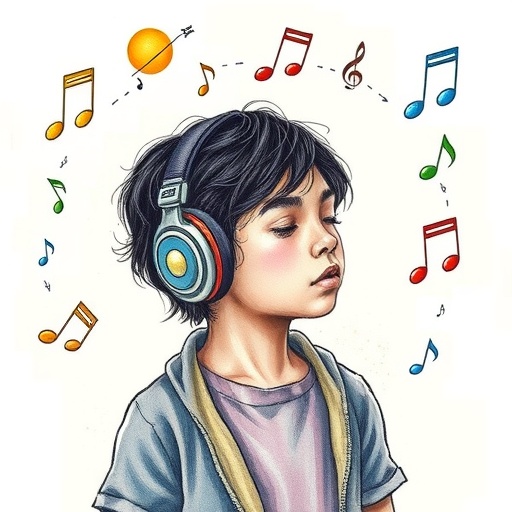Recent research has unveiled compelling insights into the nuanced interactions between auditory processing and learning. The study conducted by Schmidt-Kassow and colleagues delves into how individual differences in auditory processing can significantly influence the effects of auditory-motor coupling on paired-associate learning. This study sheds light on a critical but often overlooked aspect of cognitive science—the diversity of auditory cognitive abilities across individuals and how these differences play a pivotal role in learning efficiency and effectiveness.
Auditory processing is a complex cognitive function that involves the brain’s ability to recognize, interpret, and respond to sounds. This skill not only aids in communication but also plays a significant role in various learning processes, particularly in multimodal environments where sound plays an integral role. The research team hypothesized that individuals with varying levels of auditory processing skills would respond differently to auditory-motor coupling strategies designed to enhance learning.
The methodology of the study was meticulously crafted to explore these hypotheses. Participants underwent a series of auditory processing assessments to establish their baseline capabilities. Following this, they engaged in paired-associate learning tasks, where learning was facilitated through auditory cues linked to motor actions. The primary goal was to assess whether individuals with superior auditory processing skills exhibited enhanced learning outcomes compared to their counterparts with less developed auditory processing abilities.
The findings were striking. Individuals with strong auditory processing abilities demonstrated significantly better performance in paired-associate learning tasks when auditory-motor coupling was employed. This correlation suggests that efficient auditory processing can amplify the benefits of leveraging sound in conjunction with physical responses during learning activities. In stark contrast, those with weaker auditory processing capabilities struggled to capitalize on these auditory-motor cues, indicating that learning strategies employing sound must be tailored to fit the individual learner’s auditory profile.
Interestingly, the researchers discovered that the degree of interindividual variability in auditory processing could serve as a predictive marker for learning outcomes. This revelation has vast implications for educational strategies and cognitive training programs. By acknowledging and addressing individual differences in auditory processing, educators can devise more effective learning experiences tailored to diverse auditory cognition profiles. Such a personalized approach may yield significant improvements in learning and information retention.
Moreover, the study highlights a broader trend within cognitive science—the move towards personalized learning paradigms. The research emphasizes the importance of understanding not just the ‘one-size-fits-all’ approach to education, but rather cultivating a learning environment that is sensitive to the unique cognitive profiles of each learner. Understanding how auditory processing interacts with motor functions can lead to more nuanced and effective educational interventions, enhancing overall learning outcomes.
The implications of this work extend beyond educational settings. In therapeutic contexts, for example, techniques that combine auditory stimuli with physical responses could be strategically employed to aid in the rehabilitation of individuals with auditory processing disorders. This could pave the way for novel intervention strategies that utilize auditory-motor coupling to improve cognitive functions across various populations.
As auditory processing continues to receive enhanced focus within psychological and educational research, the potential applications of this work are boundless. Future studies could investigate how these findings might correlate with other cognitive domains, such as visual processing and motor coordination, creating a holistic understanding of how different sensory modalities work in concert during the learning process.
The findings from Schmidt-Kassow et al. also provoke further inquiry into the mechanistic underpinnings of auditory-motor coupling. How exactly does improved auditory processing facilitate learning in conjunction with motor actions? What neurological pathways are activated during these processes? These questions remain open for future investigation but underscore the significance of interdisciplinary collaboration between neuroscientists, psychologists, and educators.
In addition to advancing scientific knowledge, the results of this study hold promise for the development of innovative learning tools and frameworks. Imagine educational software that adapts its instructional strategies based on assessments of a student’s auditory processing capabilities. Such technologies could revolutionize personalized learning, making it accessible and effective for a broader range of learners.
The research by Schmidt-Kassow and colleagues adds a valuable piece to the intricate puzzle of human cognition. It reminds us that the path of learning is not uniform but rather a vibrant tapestry woven from myriad cognitive threads. Each individual brings a different auditory processing skill set to the table, and acknowledging this diversity can empower educators and learners alike.
The narrative begins around individual variances in auditory processing but ends with an invitation to the scientific community to delve deeper into this field. We stand at the precipice of a profound understanding of how our auditory capabilities shape our learning experiences, and the potential implications of these findings may reshape the future of both education and cognitive therapy.
This study is an important reminder of the complexities within human cognition and the need for multifaceted approaches in understanding how we learn. By embracing the variability in auditory processing, researchers and educators can create more dynamic, engaging, and effective learning environments that respect and enhance individual strengths. Ultimately, the future of learning could be significantly brighter by harnessing the power of sound in thoughtfully designed educational frameworks.
Subject of Research: The interplay between auditory processing and learning through auditory-motor coupling.
Article Title: Interindividual differences in auditory processing moderate the effect of auditory-motor coupling on paired-associate learning.
Article References: Schmidt-Kassow, M., Kasper, J., Diefenbach, C. et al. Interindividual differences in auditory processing moderate the effect of auditory-motor coupling on paired-associate learning. Sci Rep 15, 36295 (2025). https://doi.org/10.1038/s41598-025-23360-w
Image Credits: AI Generated
DOI:
Keywords: Auditory processing, auditory-motor coupling, paired-associate learning, cognitive science, educational strategies, personalized learning.




